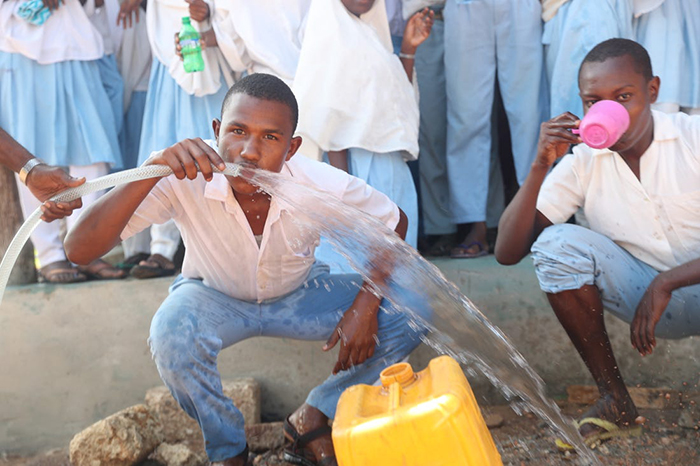- About
- Topics
- Picks
- Audio
- Story
- In-Depth
- Opinion
- News
- Donate
-
Signup for our newsletterOur Editors' Best Picks.Send
Read, Debate: Engage.
| February 22, 2022 | |
|---|---|
| topic: | Food Security |
| tags: | #Sahel, #climate change, #cistern, #Food and Agriculture Organisation (FAO), #water, #sustainable farming |
| located: | Chad, Mali, Burkina Faso, Gambia, Senegal, Togo |
| by: | Bob Koigi |
In the Sahel region, one of the most water-stressed areas in the world, water-related conflicts have reached epidemic proportions as dwindling supplies occasioned by climate change and mismanagement of water sources take a heavy toll on the local population - estimated at 80 million people.
Women in the vast region, which straddles six countries - among them Mali, Chad, Niger, Burkina Faso, Senegal and Mauritania, walk for miles in search of the now-rare resources, with their children strapped to their backs. A bulk of the residents is heavily reliant on agriculture and livestock rearing, with two out of every three people earning a living through agriculture. Poor yields due to low soil fertility and unpredictable weather, coupled with lack of pasture for their livestock, have seen intermittent clashes among the dwellers of the region. The situation has taken a dangerous twist with the entry of militant groups that control water points. The largest lake in the region, Lake Chad has been depleted and is on the verge of running dry.
But as the competition for food and water exacerbates, a new project is offering a lifeline to thousands of residents. Dubbed One million cisterns for the Sahel, the initiative seeks to tap rainwater and store it to be used in homes and for farming, an innovative model that is also creating jobs for women and youths, who are the most affected by climate change.
It is modeled on a Brazilian project called Program One Million Cisterns, which works in the semi-arid areas of the South American country and is implemented through the Zero Hunger programme. The Sahel initiative is being chaperoned by Food and Agriculture Organization of the United Nations (FAO).
The Sahel cistern project involves constructing a shed that has Zinc roofing, which collects rainwater in a drain using two pipes. In a seamless style, one of the pipes dispels dirty water, which ensures that the roof of the shed has been cleaned. Because this water is not fit for human consumption, it is tapped to be used in farming through irrigation. After the roof is cleaned, the first pipe closes to give way to the second pipe, which drains the rainwater to a cistern, a form of a tank; this water is then used for human consumption.
A 15 cubic meter tank can cater to the drinking water needs of up to 10 people. Families have been able to establish small gardens growing an array of crops, including vegetables which they use to boost their nutrition and food security needs during the eight months when the region experiences severe dry spells. Residents have also received training in good water management skills and building adaptation to climate change in the agriculture sector.
The youth have been trained on construction of the cisterns through FAO’s cash for work programme, which has given them a source of income.
Already, more than 10,000 people have benefitted from the cisterns allowing them access to water for agriculture and production inputs in Burkina Faso, Chad, Gambia, Mali, Senegal and Togo.
"The one million cisterns for the Sahel initiative aims at providing water access, inputs for climate-resilient agriculture, social protection and capacity building, targeting vulnerable rural households in arid and semi-arid regions affected by climate shocks," says FAO in a report. "The project also focuses on women, who have a fundamental role in agricultural production activities in the Sahel."
The initiative is a breath of fresh air, coming at a time when data indicates that 3.5 million people in the region are in need of humanitarian assistance and 2.1 million are in a food crisis.
The One million cisterns for the Sahel initiative is therefore seen as an innovative way to integrate sustainable farming to the lives of the Sahel population while building resilience against future shocks.
Image by John Hogg / World Bank


By copying the embed code below, you agree to adhere to our republishing guidelines.

